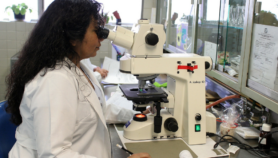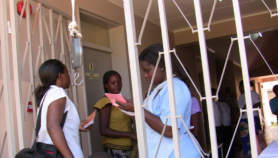By: David Dickson
Send to a friend
The details you provide on this page will not be used to send unsolicited email, and will not be sold to a 3rd party. See privacy policy.
Kuwait and Bahrain have become the latest two countries to support the idea of creating a new international fund for promoting science and technology in the Muslim World.
The proposal for such a fund, to which each member state would contribute at least 0.1 per cent of its gross domestic product, has been put forward by Pakistan, with the active support of its president, General Pervez Musharraf.
The idea was endorsed earlier this year by ministers from 22 Muslim countries organised by the Standing Committee on Scientific and Technological Cooperation (COMSTECH) of the Organisation of Islamic Conference.
Since then, Atta-ur-Rahman, Pakistan’s minister of science and technology, and coordinator-general of COMSTECH, has visited 11 countries to promote the idea of such a fund.
During a meeting last week with Sheikh Mohammed Sabah Al-Salem Al-Sabah, the acting foreign minister of Kuwait, Atta-ur-Rahman said that the poor state of investment in scientific and technological development in the Muslim world was one of the main reasons for the current underdevelopment of Muslim countries.
According to a press statement issued in Islamabad, the Kuwaiti minister expressed his government’s support for the idea of a Pan-Islamic fund, based on the COMSTECH proposal, and will give the proposal its “serious consideration”.
Similar reactions are reported by the Pakistan ministry from other Muslim leaders. Two weeks previously, for example, Atta-ur-Rahman met with the Sultan of Brunei, one of the world’s richest men, who also indicated his government’s enthusiasm for the project.
The proposal being presented to the Muslim states is that the fund would be used to build centres of excellence in Muslim countries in fields ranging from information technology and biotechnology to renewable energy.
About 80 per cent of the funds donated by a country would be spent within that country. The remaining money would be used to build up collective strengths in scientific programmes and in research management skills, with the goal of building up what is described by the ministry in Pakistan as “a uniform approach for development”.
Atta-ur-Rahman has already presented his ideas to political leaders and senior government officials in Saudi Arabia, the United Arab Emirates, Qatar, Syria, Malaysia, Iran, Egypt and Tunisia, as well as Brunei, Kuwait and Bahrain.
After their meeting last week, the King of Bahrain, His Majesty Shaikh Hamda Bin Isa Ali Khalifa, who had expressed his appreciation of the Pakistan initiative, told Atta-ur-Rahman: “We are sailing in the same boat [and] carving the same policies of Muslim brotherhood. We have a joint destiny.”
© SciDev.Net 2002
See also:













